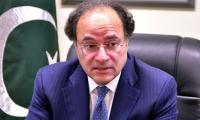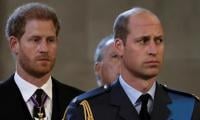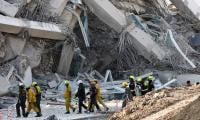LONDON: The United States government has offered that businessman and former Abraaj Group founder Arif Naqvi will not be held at the two notorious prison facilities – Metropolitan Correctional Center (MCC) or Metropolitan Detention Center (MDC) – and that he will be held in an alternative prison in the event that Westminster Magistrate’s Court ordered his extradition to face 16 charges and up to 300 years in the US.
This is in addition to an earlier commitment that he would be allowed bail if extradited. Taken together, the US has never made such concessions in an extradition court. At what was supposed to be the last summing up date of the extradition hearing at the Westminster Magistrates’ Court, the US government lawyer Mark Summers QC scrambled at the eleventh hour to try and offer assurances that Mr Naqvi will be held in alternative prison.
The US government lawyer confirmed to the court that he had sought assurance from his own client in US about Arif Naqvi. The development happened on the back of strong evidence put forth by the legal team of Arif Naqvi over the course of two weeks of hearing. Naqvi has throughout denied any wrongdoing and the court heard confirmations that Abraaj had returned all the money to the US agencies and creditors including to Melinda and Bill Gates Foundation.
The US government lawyer initially provided an undertaking in an attempt to get Naqvi to the US on the premise he would get bail when in US but the US government didn’t provide full guarantees - and that also means that such vague guarantees do not bind any judge to ensure that the government sticks to an undertaking.
On Wednesday, Arif Naqvi’s lawyers said the undertaking could not be relied upon and showed instances where judges have denied “joint bail applications” by both prosecution and defence with defendants still being imprisoned and denied bail.
The US lawyer attempted to offer an assurance and said they would come back but could not tell where and what the terms of the assurance were but he assured that the prison facility wouldn’t be MCC or MDC in the event of pre-trial detention. This was done likely because of the strength of the evidence submitted by Naqvi’s lawyer.
Mark Summers asked the court for two weeks to provide an understanding of the assurance and pushed for not calling evidence, which was meant to be heard on Wednesday. Once the location would be known, the Chief Magistrate would then have to give the defence time to respond and hence will require further hearings to determine the next steps.
The judge has indicated that there are real risks in her pre-provisional view associated to US prisons after evidence submitted showed clear breaches of human conditions. Hugo Keith QC, Naqvi’s lawyer, said, “This undertaking has come in the eleventh hour and the 59th minute of the eleventh hour with no understanding of what the assurance actually is. We know nothing about the assurance and if the assurance is not found to be acceptable, you (the Chief Magistrate) will have to consider risks of MCC/MDC. He added, “It is clear US government is using a complete end-around of the US justice system in an attempt to save their case. MCC and MDC evidence has been known by them since 23rd January and they have had six months to consider that.”
Arif Naqvi’s lawyer had explained to the court the risks Arif Naqvi will face in the US including racism, threats to health and denial of justice.
It is worth to mention that an undertaking on bail or assurances the US government is providing shows the US is feeling cornered in the context of COVID-19 outbreak, Black Lives Matter movement and racism, not to mention the unexplained deaths in prisons recently.
Hugo Keith QC said, “It’s quite plain that what a tactical chicanery (tricks) is that US government is trying to take some action against an adverse ruling to them.”
The US while conceding that Naqvi wouldn’t be held in MCC and MDC and were willing to give assurances, maintained during the trial that there is no real risk of detention and so evidence is irrelevant and even if it was, evidence of anonymous hearsay accounts at both facilities do not cross the threshold. The US lawyer tried to discount real witnesses who worked at those prisons giving full accounts of the information and how prison conditions are a nightmare and where Mr Naqvi is likely to be in danger.
It will now take two weeks for the assurance process and a case management hearing will take place on 21st of July. The full hearing will likely place in or around September.
Gun, resident added, accidentally went off and the bullet hit him in chest, leaving him critically injured
IHC issues an order in this regard, during hearing on mother’s petition regarding disappearance of her two sons
PM says attitudes of extremism, hatred and division are contrary to Islam’s teachings of unity and brotherhood
Both sides discuss measures to ensure smooth operations including customs facilitation and regulatory alignment
PTI is united under leadership of party founder, Gohar said
Third-party audit played critical role in identifying non-compliant firms, leading to their immediate closure







